AI’s Role in Increasing Energy Efficiency in Electric Vehicles
As we continue to experience the effects of climate change, the need for energy-efficient solutions in every domain has become more urgent than ever before. The transportation sector, in particular, has been undergoing a transformative shift, with electric vehicles (EVs) emerging as a robust response to decreasing carbon emissions. But what gives these EVs an edge is their affiliation with Artificial Intelligence (AI). Artificial intelligence, a formidable force in the tech world, is beginning its foray into the realm of EVs, setting the stage for a profound synergy of technology and transportation. This piece explores the exciting sphere of electric vehicles, offering insights into their workings and their relationship with AI, with an emphasis on how this powerful technology is being leveraged to enhance energy efficiency.
Understanding Electric Vehicles
Understanding Electric Vehicles: The Basics
Electric vehicles (EVs) are automobiles that rely on electric motors for power, instead of internal combustion engines that burn fossil fuels. They draw electricity from the grid and store it in their high-capacity, rechargeable batteries. When the EV is in operation, the stored electricity powers the motor that drives the vehicle. Essentially, EVs transform electrical energy into mechanical energy.
EVs come in various types, including Battery Electric Vehicles (BEVs), Plug-In Hybrid Electric Vehicles (PHEVs), and Hybrid Electric Vehicles (HEVs). This text, however, will specifically discuss the battery-operated electric vehicles (BEVs), which run entirely on electricity and do not have conventional engine backups. Some popular examples of BEVs are Tesla Model 3, Nissan Leaf, and Chevrolet Bolt.
The Environmental Impact of Electric Vehicles
Unlike traditional cars, EVs do not emit tailpipe pollutants when operating, making them environmentally friendly. They contribute less to global warming and reduce our dependency on fossil fuels. However, the magnitude of their environmental impact primarily depends on the sources of the electricity that charges the EVs. For instance, if the electricity emanates from renewable energy, the carbon footprint reduces remarkably.
Battery-Operated Electric Vehicles: Design and Range
BEVs are specifically designed to be energy-efficient. They convert nearly all of the electrical energy from the grid to power at the wheels, unlike gas vehicles that waste about two-thirds of their fuel energy. The high capacity batteries of electric cars can store a substantial amount of energy, enough for most daily driving needs.
The range of a BEV—how far it can travel on a fully charged battery—varies depending on the model and the driving conditions. It can range from about 80 miles to over 370 miles. However, it’s important to note that battery technology is advancing rapidly. Consequently, future electric cars are likely to feature even more extended ranges.
Current State of the EV Market
The EV market is currently experiencing exponential growth. According to BloombergNEF, the global market is expected to grow from 2.5% in 2020 to 10% by 2025, and to 28% by 2030. Consumer interest, government regulations, advances in battery technology, and infrastructure improvements are driving this development.
AI’s Crucial Role in Enhancing Electric Vehicles’ Energy Efficiency
In the modern age, Artificial Intelligence (AI) stands out as a key contributor to improving electric vehicle efficiency. There are several ways in which AI achieves this:
- Battery Management: One of the essential applications of AI is in battery management, maximizing charging and discharging efficiency, thereby improving battery life. AI algorithms consider various variables such as the time of day, battery temperature, and grid demand to pick the optimal charging time for the vehicle.
- Range Prediction: AI can analyze factors like driving patterns, traffic scenarios, and weather conditions to provide more accurate predictions of vehicle range. This technology helps to alleviate ‘range anxiety’, a common worry among electric vehicle drivers about the battery being drained before reaching the desired destination.
- Smart Grid Integration: With the escalating demand for power from electric vehicles, the role of smart grids is becoming increasingly vital. AI proves instrumental in balancing the power demand and supply on the grid, managing charging stations, and occasionally using the cars as mobile energy storage, feeding electricity back to the grid when necessary.
- Autonomous Driving: AI significantly contributes to making driving styles more energy-efficient, giving autonomous electric vehicles the ability to choose the most energy-saving routes.
To sum up, the collaboration of AI and electric vehicles is paving the way for enhanced energy efficiency, exemplifying a promising outlook for sustainable transportation.
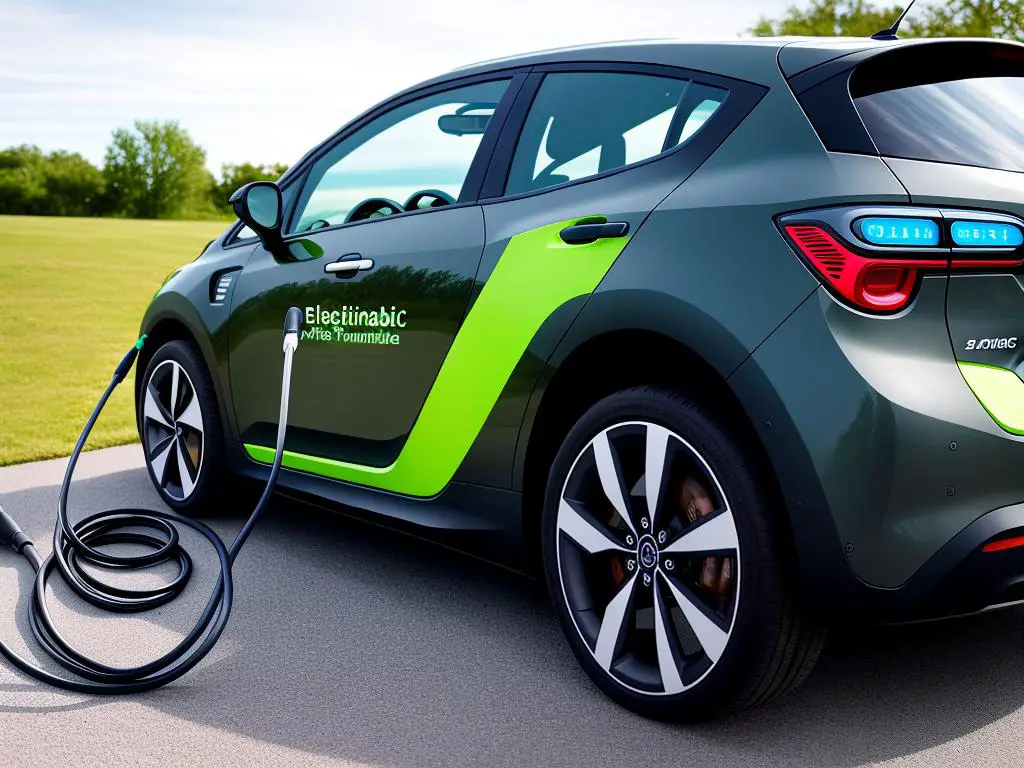
Brief on Artificial Intelligence
Demystifying Artificial Intelligence
Artificial Intelligence (AI), an intricate branch of computer science, is dedicated to the development of smart machines that emulate human intelligence by learning, responding, and working in a similar fashion. AI comprises various components that encompass machine learning, cutting-edge algorithms, neural networks, and predictive analytics.
The inception of AI is rooted back in the mid-20th century, triggered by the computer scientist Alan Turing’s thought-provoking question, “Can machines think?” This question set the foundation for the Turing Test, a distinctive measure still being used today to evaluate a machine’s capacity to demonstrate intelligent behavior.
The varieties of AI include narrow AI, designed to carry out a specific task like voice recognition, and general AI, theoretically capable of executing any human task. Another variant is superintelligent AI, an advanced type of AI characterized by surpassing human intelligence in a vast array of professionally relevant domains.
AI in Modern Applications
Today, AI is a part of everyday life. It powers voice-activated virtual assistants, route planning on GPS, and recommendation engines on streaming platforms. It is used in healthcare for diagnosing diseases, in finance to manage investments, and in retail to personalize customer experience.
Introduction to AI for Energy Efficiency in Electric Vehicles
In the auto industry, AI is used in a variety of ways, from self-driving technology to preventive maintenance. However, one of the most innovative applications is in the area of energy efficiency for electric vehicles (EVs).
Electric vehicles, unlike traditional gasoline-powered cars, utilize electricity as their primary source of fuel. As technology in this sector advances, so does the need for more efficient energy use, and AI presents a promising solution to this challenge.
AI Algorithms and Energy Efficiency
Machine learning and advanced AI algorithms play a key role in predicting and managing the energy usage of EVs. Algorithms can adjust to a driver’s behavior, road conditions, and weather patterns to optimize the vehicle’s energy use. This not only improves the efficiency of the car but also increases its range, a key concern for many potential EV owners.
The Role of Neural Networks in EVs
Neural networks, a key component of deep learning, are used to simulate human decision-making processes, providing the basis for smarter, more energy-efficient driving.
For example, neural networks can be used to train an EV’s system to predict the optimal time for recharging based on driving patterns and electricity costs. This allows the vehicle to take advantage of periods of low demand when energy prices are usually lower.
Predictive Analytics for Improved Energy Efficiency
Predictive analytics, another important application of AI, provides insightful forecasts for electric vehicle users. By analyzing past data, AI can predict future energy needs and suggest the most efficient routes for travel or the best times to charge.
Harnessing predictive analytics in this way can significantly improve the energy efficiency of EVs, reducing both their running costs and their environmental impact.
AI’s Significant Role in The Future of Electric Vehicles
Artificial Intelligence (AI) is set to revolutionize the electric vehicle (EV) landscape in an impressive way. Recognizing the escalating demand for sustainable and efficient energy practices, AI technologies will prove pivotal in shaping more eco-friendly, cost-effective, and proficient electric transport options.
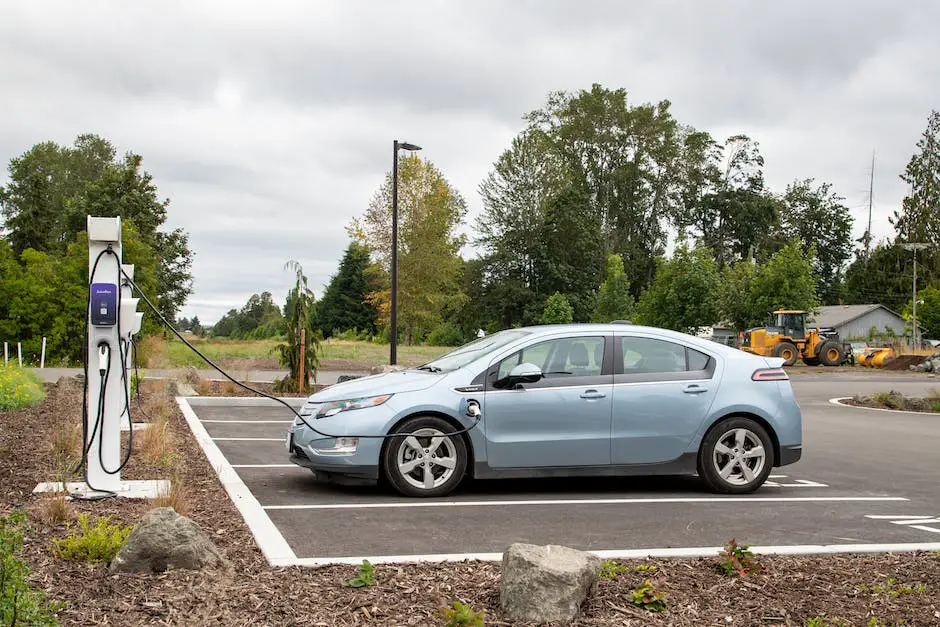
AI in Electric Vehicles
How AI is Refining Electric Vehicles
AI’s influence is not just confined to innovation, it is the backbone driving the rise and enhancement of electric vehicles (EVs). This sophisticated technology contributes to making EVs operate more seamlessly and ensures a safer commute for passengers.
More than just facilitating vehicle automation, the transformative AI-driven tech in the EV domain now leverages machine learning and cutting-edge analytics. This leads to progressive enhancements in vital EV features such as smart navigation, autopilot, and collision avoidance systems.
AI for Autopilot in Electric Vehicles
One of the most noticeable applications of AI in electric vehicles is autopilot mode. By incorporating this technology, it allows the vehicle to almost completely take over driving, with minimal human input required.
Tesla, the leading name in the electric vehicle industry, is at the forefront of vehicular autopilot technology, going so far as to introduce ‘Full Self-Driving’ software in selected models. Largely powered by AI, the system is able to interpret and respond to varying traffic conditions and adjust the vehicle’s movements accordingly. However, it is still advised that drivers remain alert and attentive even in autopilot mode.
Collision Avoidance Systems and AI
Aside from automated driving, AI also plays a significant role in collision avoidance systems. These systems typically employ an array of sensors to collect data on various objects all around the vehicle. AI then processes this data in real-time to detect potential collision threats from any direction, alerting the driver or even applying emergency brakes when necessary.
This AI-enabled safety feature is now becoming a priority in many electric vehicle models, including those produced by widely recognized companies like Nissan. These systems also integrate machine learning capabilities, allowing continuous performance improvement based on the data they collect.
AI-Powered Smart Navigation
AI-powered smart navigation systems are also highly beneficial in EVs, as they help conserve energy by determining the most efficient routes.
Through AI algorithms, these systems gather and analyze data from different sources, such as weather reports, traffic data, and road conditions. By evaluating these factors, the system can then project the most energy-efficient route for the vehicle to take.
Google’s electric vehicle Waymo employs this kind of AI technology. It can make sense of unstructured data like the behavior of other drivers or the layouts of construction zones, and respond accordingly by taking the appropriate actions.
AI for Energy Efficiency in Electric Vehicles
Another important aspect of AI integration into electric vehicles is energy efficiency. Through its capacity for machine learning, predictive analysis, and real-time monitoring, AI can optimize different aspects of the vehicle, such as driving habits, speed, weather conditions, and traffic flow.
By learning from these patterns, AI can provide the driver with suggestions on enhancing energy efficiency and also reduce CO2 emissions. Some electric vehicles with AI systems, like the BMW i3, are capable of shifting to a more energy-efficient mode during city driving to conserve battery power.
In an era filled with technological advancements, the intertwining of Artificial Intelligence (AI) and electric vehicles (EVs) stands as a groundbreaking development. AI integration within EVs has been instrumental in elevating safety, enhancing efficiency, and amplifying the vehicles’ range. It heralds a sustainable, eco-friendly approach to transportation that aligns with the future’s needs.
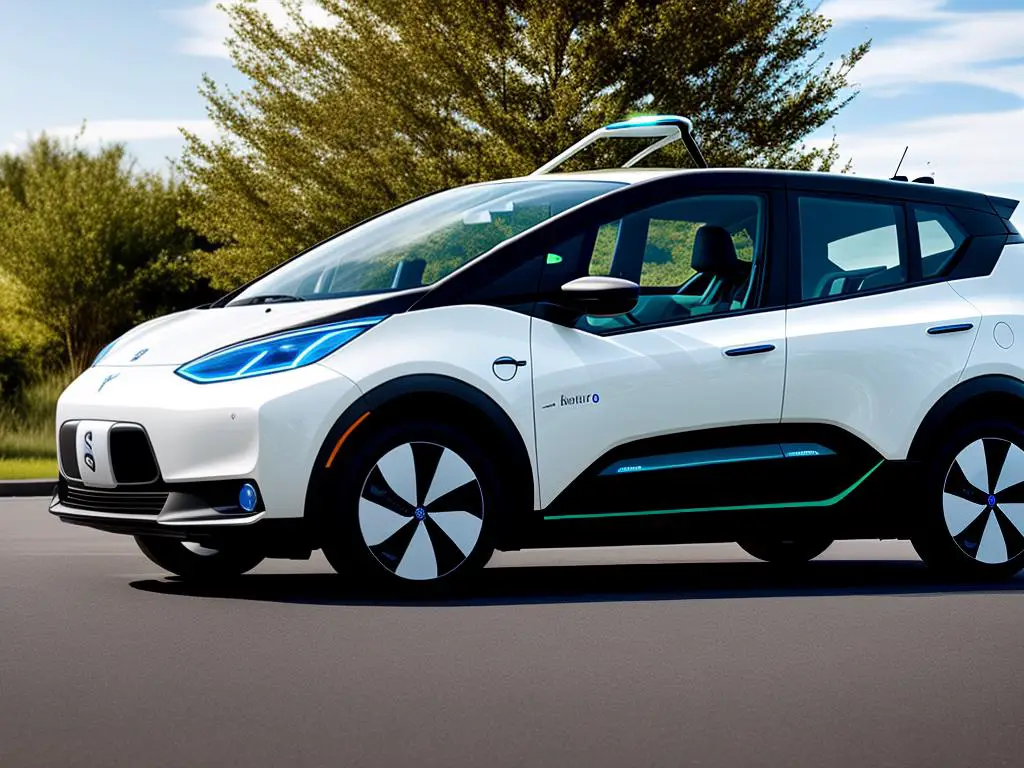
AI and Energy Efficiency
AI Amplifying Energy Efficiency in Electric Vehicles
AI, with its dynamic capabilities, has the profound potential to vastly improve energy efficiency within electric vehicles, enabling power to be utilized more effectively thus cutting overall consumption. It inherently contributes towards sophisticated energy management while also prolonging the battery lifespan in an EV. These cognitive, AI-propelled models can forecast battery health, accurately estimate a vehicle’s range, and also predict energy requirements in response to varying parameters.
Application of AI for Power Consumption
AI algorithms can be utilized to monitor and analyze multiple data points related to the vehicle’s driving style, route, traffic conditions, and even weather. All these different factors can impact energy consumption to a significant degree. By leveraging machine learning, AI systems can predict future driving conditions and suggest the most energy-efficient course of action.
For instance, if the system predicts heavy traffic on the usual route, it may suggest an alternate route to avoid frequent stop-and-go situations. Accelerating and slowing down in rapid succession can substantially drain the battery in electric vehicles. Therefore, redirecting the vehicle to a smoother, more consistent traffic flow can result in considerable energy savings.
AI in Battery Life Extension
A major concern for electric vehicle owners is the longevity and overall health of their vehicle’s battery. AI has shown promise in this aspect as well.
Certain machine learning models, such as predictive analytics, can be used to anticipate a battery’s health based on its usage pattern, charge cycle, and other pertinent factors. For instance, if the algorithm determines that a particular charging pattern is detrimental to the battery’s health, it can suggest an alternate pattern to prolong the battery’s lifespan. Furthermore, machine learning algorithms can predict when a battery may fail based on these patterns.
Optimizing Energy Management
AI can be invaluable in energy management for electric vehicles, primarily through the use of deep learning networks. These networks can analyze complex data, make intelligent decisions, and optimize overall energy efficiency.
One application of this technology is in smart grid technology. In this scenario, AI can help manage the vehicle’s energy load and need in real-time. For example, if the system recognizes the battery is near full capacity and the vehicle won’t be used for a while, it can decide to discharge some of the energy back into the grid.
AI-Mediated Vehicle Range Prediction
Electric vehicle drivers often worry about their vehicle’s driving range on a single charge, also known as “range anxiety.” Here too, AI comes to the rescue.
With machine learning algorithms, an electric vehicle’s AI system can take into account factors such as the vehicle’s current charge, its energy consumption patterns, the condition of the battery, the chosen route, and external conditions such as traffic or weather, to predict the vehicle’s range accurately.
This predictive model allows the driver to plan their trips more efficiently and also helps in mitigating any range-related concerns.
Artificial Intelligence (AI) provides innovative strategies to significantly enhance energy efficiency in electric vehicles. Through optimizing these AI-empowered measures, power consumption can be lowered, battery life can be extended, energy management can be made more efficient, and the abilities to predict the vehicle’s range can be improved.
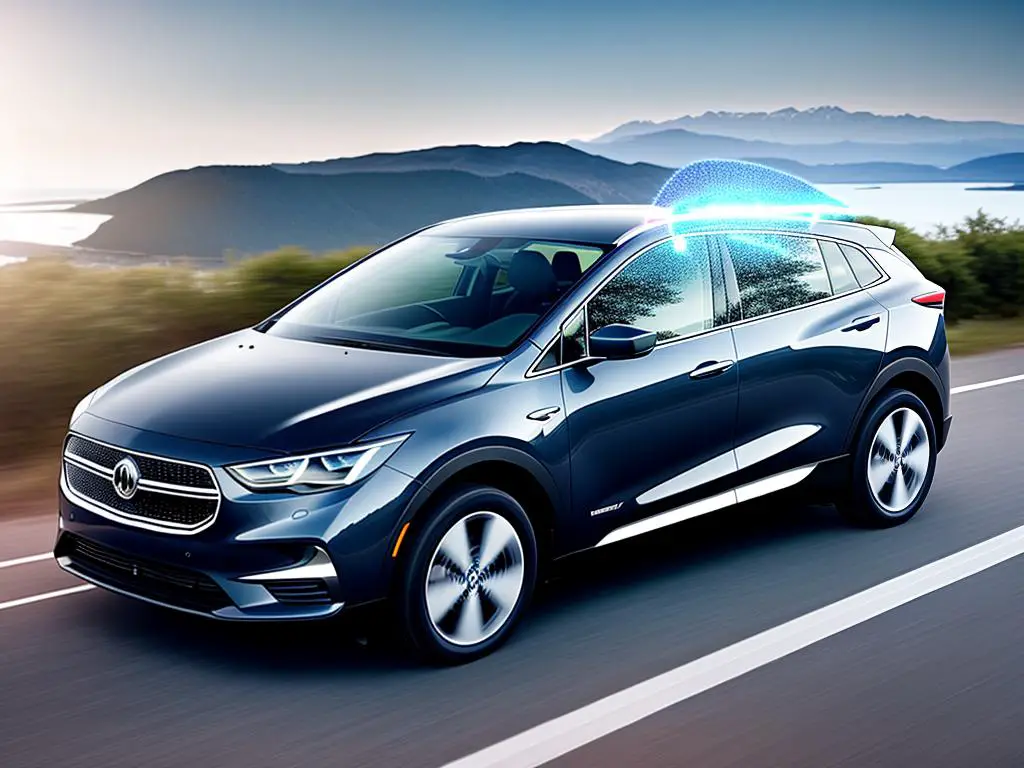
Case Studies and Future Outlook
Understanding AI in Electric Vehicles: Case Studies
The utilization of AI in electric vehicle technology is perhaps best demonstrated by Tesla, a worldwide front-runner in the sector. Tesla’s range estimation, a significant feature of their vehicles, operates using an AI-driven energy prediction system. It works by collecting live data from multiple sensors and systems such as the battery’s temperature, the driver’s habits, and the current load on the vehicle. This enables the AI to accurately anticipate energy consumption, therefore providing a reliable prediction of the vehicle’s remaining range.
Another case is Faraday Future, a California-based EV startup.
The company developed an AI system known as FF Intelligent Mobility Ecological System (FF IMES). This system includes an intelligent driving assistant and a predictive power management system. The latter uses AI algorithm to accurately measure the vehicle’s energy consumption. By studying a driver’s operation style, habits, and the surrounding environment, FF IMES can optimize energy usage and maximize the driving range.
Moreover, Nissan unveiled their EV, the Nissan LEAF, with an intelligent range prediction system.
The onboard computer uses an AI model to study driver behavior and driving conditions and estimate energy usage. The LEAF can then provide a more accurate prediction of its range, helping drivers plan their trips better.
AI in EV Charging Stations
AI also plays an integral part in energy management at EV charging stations. For example, eMotorWerks, a company involved in EV charging solutions, developed the JuiceNet platform. This AI-driven platform manages the power load at charging stations by responding to real-time demand and supply fluctuations and optimizing charging times.
Also, Google’s DeepMind has been experimenting with using AI in optimizing power usage in data centers.
Their AI-driven system reduced energy usage by 40%, indicating the potential of AI in creating more energy-efficient infrastructures. This same technology could be adapted to public and private EV charging infrastructures yielding significant reductions in energy usage.
Future Outlook
Looking into the future, AI can be expected to play an even larger role in the electrification of vehicles, contributing to increased energy efficiency. As AI algorithms are refined and more data is gathered, the accuracy of range predictions will grow, potentially rendering ‘range anxiety’ a thing of the past.
Researchers are also looking at ways to use AI to optimize battery health and lifespan.
Battery degradation is a concern in EVs, and maintaining optimal battery health can extend their lifespan, increase driving range, and improve overall vehicle efficiency.
Additionally, autonomous driving technologies are set to make a splash in the world of EVs.
AI systems are crucial in sensor processing and decision-making processes, allowing vehicles to navigate the roads safely. As these technologies mature, they will become progressively energy-efficient, allowing for EVs with greater range and increased energy-saving potential.
In conclusion, AI has a critical role in increasing energy efficiency in EVs, from accurate range prediction to optimizing charging infrastructure.
As the field of AI and machine learning continues to grow, the energy efficiency and performance of EVs will undoubtedly improve, paving the way for a greener and more sustainable transportation future.
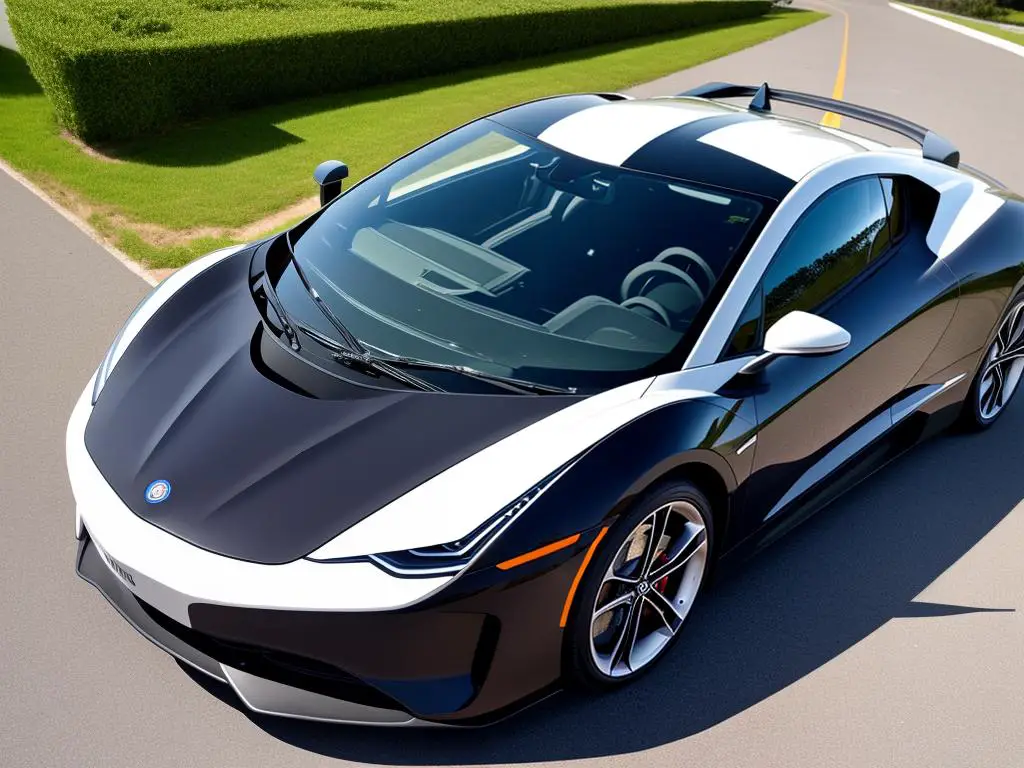
Exploring real-world case studies has shown us the remarkable achievements already made in integrating AI with electric vehicles for improved energy efficiency. Companies across the globe are conducting groundbreaking work in this domain, paving the way for a future that promises extraordinary advancements. Alongside these practical implementations, considerable research is ongoing, bringing us one step closer to realizing the full potential of AI in EVs. This technological fusion might just hold the key to a more sustainable future, promising not only environmental benefits but revamping the driving experience and pushing the boundaries of what is conceivable in the transport sector. As these technologies continue to evolve, the road ahead looks nothing less than electrifying.
Discover Writio, the AI-powered content writer for publishers. This page was crafted by Writio, your dependable writing companion.
